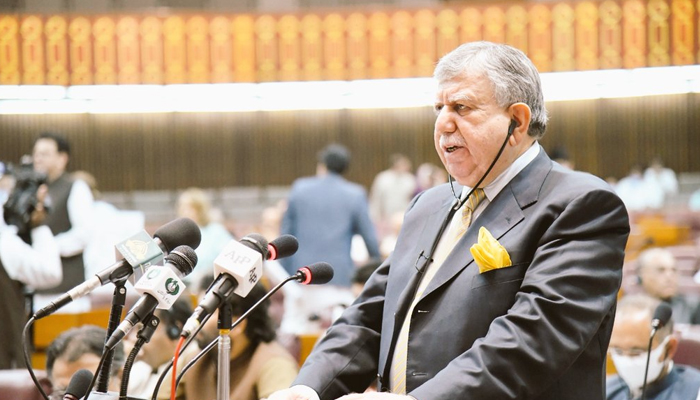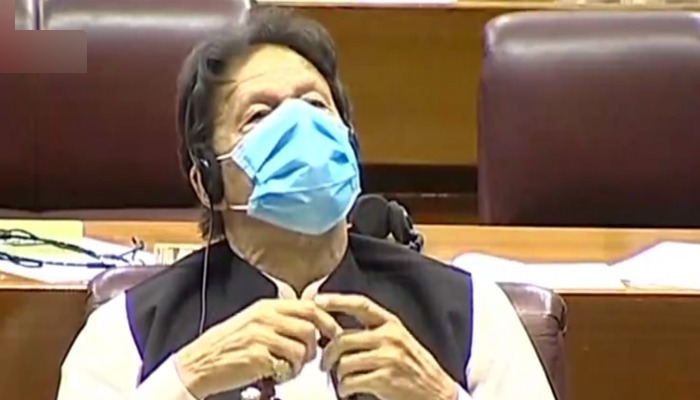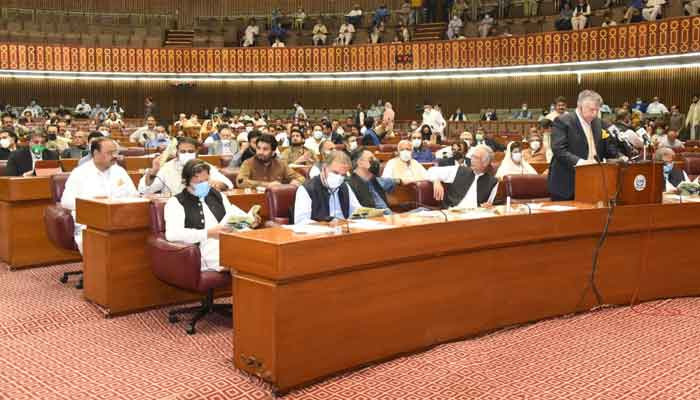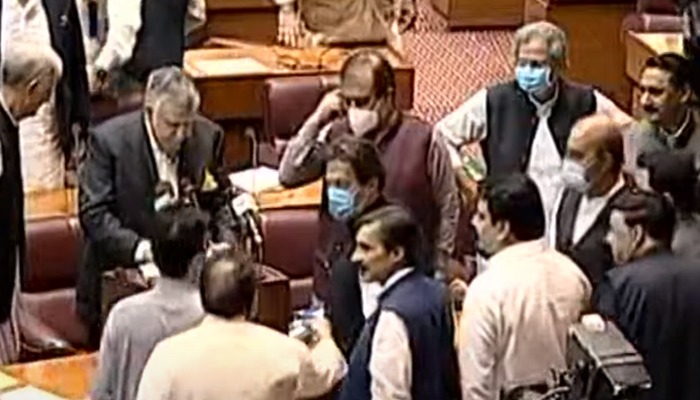The budget of a political government is a reflection of its political agenda and election manifesto. It looks like a cumbersome document with budget figures, but in it the political government, in line with its vision, diverts resources to sectors that can revive the economy as well as provide maximum relief to the people. However, this situation has not been seen in any of the previous budgets of the Pakistan Tehreek-e-Insaf (PTI) and the economy has continued to decline due to which the tax collection targets have not been met and the GDP has continued to decline.
As the Budget 2021-2022 was presented in the National Assembly on Friday, one thing was clear: the government was aiming to please as much of the population as it could.
Earlier in the day, Prime Minister Imran Khan had said "everyone would be happy" with the budget and the reduction of taxes on several industries seemed to reflect that.
The budget included exemptions and relief measures for nearly all industries, and new businesses and products being brought into the tax net seemed far fewer in comparison. The automobile sector was a heavy beneficiary with tax exemptions for small cars and four-wheelers.
However, not all of it was good news for the average consumer, especially with the imposition of federal excise duty (FED) on cellular services and e-cigarettes.
Here Dawn.com takes a look at what items will get cheaper and what will get more expensive in the new fiscal year that will start on July 1.
Cocoa paste and butter
Regulatory duty on the import of cocoa paste, butter, and powder will be reduced. This could mean a reduction in the prices of chocolate products and other baked goods. If you like to indulge, it's probably going to cost you less – at least monetarily.
Automobiles
Small cars:
Locally manufactured cars having an engine capacity of 850cc or less will be exempted from value-added tax (VAT) while the sales tax on these cars will also be reduced from 17pc to 12.5pc.
Additionally, four-wheelers will also be exempted from federal excise duty. So, if you were looking to buy a new ride for yourself, it's going to be easier on your wallet than you expected.
Situationer: Carmakers ignore middle-class buyers
Electric vehicles:
Imports of electric vehicles will be exempted from value-added tax while the sales tax on locally produced electric vehicles will be one per cent.
'On money' on car sales:
The government will also impose a tax on "on money" for vehicles that are disposed of without registration. "On money" or premium refers to a process whereby impatient buyers with excess cash in hand happily pay extra money to car dealers for instant delivery instead of waiting for months on end.
Mobile services
The federal excise duty on mobile phone calls that are longer than three minutes has been set at Rs1 per call, Rs0.1 on every SMS and Rs5 on every GB of internet data. The budget document states that the decision is being taken to "reap reasonable revenue" from the telecom sector and would result in "mild taxation of a broad spectrum of the population".
However, hours after the budget was presented, Energy Minister Hammad Azhar denied the FED would be applied to internet data, saying the prime minister and the federal cabinet had not approved it.
"It will not be included in the final draft of the Finance Bill (budget) that is placed before parliament for approval," he tweeted.
The decision, if implemented, would affect over 98 million people.
E-cigarettes
Electronically heated tobacco products (e-cigarettes) will also be brought into the tax net.
Telecom
The federal excise duty on telecommunication will be reduced by 1pc from 17pc applicable previously.
Withholding tax (WHT) on telecommunication services will also be reduced to 3pc.
Fruit juices
The budget document noted that the fruit juice sector faced an "adverse situation" due to the pandemic while the prices of fruit juices had also been increased after the imposition of the federal excise duty. In FY22, the FED on fruit juices will be withdrawn.
As temperatures peak this summer, staying hydrated will cost you less!
Electricity
The threshold for withholding tax on the monthly electricity bill for domestic users who are not on the Active Taxpayers List (ATL) will be reduced from Rs75,000 to 25,000.
This means that a consumer whose electricity bill is Rs25,000 or more and who is not on the ATL will have to pay withholding tax.
Banking
The withholding tax on cash withdrawals and on non-cash banking transactions will be removed.
Thus, the devaluation of the rupee led to a sharp rise in inflation and the number of people suffering from unemployment and poverty also increased. The Pakistan Tehreek-e-Insaf (PTI) government managed to present its third budget, which was presented by the fourth Finance Minister Shaukat Tareen in the National Assembly. Presenting the budget, Shaukat Tareen made a very strange sentence part of his speech. "My principle is that it is better to go out and take the nation to the light than to stand in the graveyard and uproot the men," he said.
He may have said this to the right-wing Prime Minister Imran Khan because the Prime Minister and his cabinet are putting the responsibility of everything on the previous government. Changes in economic policy In the current budget, the finance minister has announced a change in the most important policy of the economy. Former Prime Minister Shaukat Aziz, who is named after the current Finance Minister, had proposed a trackdown effect to alleviate poverty in the country, ie, to allow the rich in the country to increase their wealth, because when the rich have extra When wealth comes, its effect will also benefit the poor. However, this ideology has not worked to alleviate poverty in the country.
The wealth of the rich class continued to increase in the country but the rich class did not distribute the wealth among the poor which resulted in the rich becoming richer and poverty in the country increased. In the current budget, Shaukat Tareen has proposed a bottom-up approach. That is to say, in order to eradicate poverty in the country, the poor must be directly assisted. In this regard, the government has set a target of providing assistance to 4 to 6 million backward families. It has decided to provide interest free loan of up to Rs. 5 lakh for doing business while interest free loan of Rs. 1.5 lakh per crop for farming families and interest free loan of Rs. 200,000 for purchase of tractors and machinery. At the same time, these families will be provided cheap loans of up to Rs 2 million to build low cost houses.
Health cards will also be provided to these families while technical training will also be provided to one member of the household. The budget aims to provide financial assistance to 4-6 million disadvantaged families Budget volume, revenue and expenditure Shaukat Tareen says that in addition to eradicating poverty in the country, industries, agriculture and investment will be given incentives to revive the economy. Before reviewing the incentives given to these sectors in the budget, let's take a look at the size, revenue and expenditure of the budget.
GDP target In the budget for the next financial year, the GDP growth target has been set at 4.8 per cent as against 2.1 per cent in the current financial year. However, according to provisional data, GDP is projected at 3.49%. The government expects 3.5 per cent growth in agricultural production, 6.5 per cent in industrial production and 4.7 per cent in services. The total volume of the budget for the next financial year has been kept at Rs. 8,487 billion while the volume of the budget for the current financial year was kept at Rs. 7,136 billion. Thus, the size of the budget has been increased by 19%. Revenue target In the budget for the next financial year, the government's revenue target has been set at Rs 6,573 billion, which is 20% more than the current fiscal year's target. The FBR's tax collection target for government revenue is Rs 5,829 billion, which is 17% more than the current financial year.
In the budget, the government's non-tax revenue has been kept at Rs 2,080 billion, which is 29 percent more than the current financial year. In addition, the government has set a target of Rs 610 billion for the petroleum development levy, which was Rs 450 billion this financial year. Cost estimate Expenditure in the budget is estimated at Rs. 6,346 billion, which is 19 percent more than the current financial year. The largest payment in expenses is interest on loans.
It is estimated that Rs 2,946 billion will be paid on interest only on loans during the next financial year. In addition, Rs 480 billion has been allocated for pensions of government employees. The fiscal deficit is estimated at Rs 3,420 billion, which is 6.3 per cent of GDP, while the fiscal deficit target for the current financial year was set at Rs 3,195 billion, which is 7 per cent of GDP. What about development projects? Compared to the previous budget, the budget for the next financial year has a significant amount for development projects. This has highlighted the possibility of increasing activities in the construction sector.
A total of Rs 2,102 billion has been allocated for development schemes, of which the federal government will spend Rs 900 billion and the provinces Rs 1,202 billion on development projects. The overall development budget for the next financial year has been set at Rs 2,102 billion Extraordinary increase in subsidies The PTI government has reversed the previous practice by allocating a substantial amount of subsidy for public relief in the next financial year's budget. Allocated Rs. 682 billion for subsidies in the next financial year.
Budget 2021-22: Government targets 4.8% growth in 'people-friendly' budget

Minister for Finance Shaukat Tarin presents PTI government's third budget.
- Govt sets growth target at 4.8%; total outlay of budget Rs8,478 billion.
- Opposition puts up resistance; attempts to interrupt speech with anti-government slogans.
All eyes were on Parliament as Finance Minister Shaukat Tarin presented the budget 2021-22 on Friday.
The finance minister was greeted by jeers from the Opposition benches, with members shouting slogans and taunting the finance minister by laughing loudly as he praised PM Imran Khan's economic initiatives.
Undeterred
and aided by a pair of earphones that allowed him to drown out the
ruckus around him, Tarin announced that the total outlay of the budget
for the upcoming year had been kept at Rs8,478 billion, with the tax
target set at an ambitious Rs5,829 billion.
Key Priorities of the Federal Government for FY 2021-22
During the last three years the government faced several economic challenges, aggravated by the COVID-19 pandemic.
The government has subsequently successfully progressed from recovery and stabilisation to sustainable growth, Tarin said.
The government's priorities henceforth are as follows:
a) Inclusive and sustainable economic growth
b) Pro-poor initiatives and social safety net through the Ehsaas Programme's vertical and horizontal expansion
c) Reduction in inflation and price control and monitoring
d) Increased development spending for more job creation
e) PM's initiatives including Kamyab Jawan and Kissan Programmes
f) Impact mitigation of Covid-19, and the continuation of the Stimulus Package
g) Circular debt financing and power subsidies
h) Revenue mobilization without new taxes
i) Support of the Housing Sector and the Construction Industry through Naya Pakistan Housing Scheme and SME support programs
j) Facilitating expatriates remittances and savings through Roshan Digital Account
k) Pakistan Remittances Initiatives and other schemes
Speaking
about the various allocations made by the government, Tarin said
Rs480bn had been allotted for pension payments of both civilians and
retired military officers.

He said the defence budget of the country had been allocated Rs1,370bn while the government had earmarked Rs1,168 for development and non-development grants for provinces.
He said the
government had allocated Rs682bn for subsidies to various sectors of the
economy, adding that Rs479bn had been allocated to run the civil
government.
Tarin
said the government was serious in stemming the spread of the
coronavirus and keeping its adverse effects at bay, adding that the
government had set aside Rs100bn for it.
He said the federal PSDP had been allocated Rs900 billion.
Tarin
lashed out at the previous governments, saying that a mountain of
circular debt amounting to Rs1 trillion was inherited by the incumbent
government due to the botched policies of its predecessor.
"We
made the [capacity] payments otherwise the country would have
defaulted," he said. "I am presenting you the real picture of the nation
and to highlight our performance," added the minister.
Tarin
said PM Imran Khan's government does not hesitate from taking difficult
decisions. He said the incumbent government had, through its sound
economic policies, turned around the current account deficit into a
surplus in 2021.
As he spoke, Opposition members continued to bang desks and shouted slogans of "Go Niazi Go!" as the minister spoke.
The minister paid tribute to the PTI government for stemming the spread of the coronavirus pandemic and taking steps to ensure businesses did not suffer massive losses in the country due to the lockdowns.
"The government, through the Ehsaas Emergency Cash Programme, provided cash to 12mn people across the country," he said.
The finance minister announced that the government had set aside Rs260bn for the Ehsaas programme in the budget.
Tarin said remittances had increased in Pakistan to record levels, adding that these are expected to rise to $29bn by the end of this month.
"This is proof of the love that overseas Pakistanis harbour for Prime Minister Imran Khan," he said.
Tarin said the economy had grown and as a result, more people had secured jobs over the years. The finance minister said that despite the coronavirus pandemic, the per capita income of the common man had increased by 15%.
Speaking about tax collection, he said it had grown by 18% and had crossed Rs4,000bn, adding that critics had no response to the government's impressive performance in this regard.

The finance minister announced that the country's economy was now entering the growth period, adding that almost every sector is growing.
He said Pakistan was seeing a "historic growth" in agriculture, stating that apart from cotton, all other crops saw extraordinary increases.
He
said that growth in the services sector helped improve numbers
pertaining to poverty and had also played a major part in generation of
wealth in Pakistan.
Tarin said Pakistan had become a food deficient nation, thanks to the policies of the previous governments. "We will have to become a food sufficient nation and for this, we will have to provide lots of incentives to farmers," he said.
"We will need to bring back administrative controls which were removed during the Musharraf era," he added.
Tarin said the government had kept the growth target at 4.8% for the fiscal year, adding that the government will not leave the poor and the destitute at the mercy of inflation.

"Never in our economic history, were poor people able to realise their dreams," he said, adding that PM Imran Khan wanted to uplift the poor.
He said the government had decided to provide interest-free loans of up to Rs500,000 to the poor.
Tarin unveils govt’s aggressive 'bottoms-up' approach to transfer ‘real benefits’ to poor
Speaking
about the importance of boosting exports so Pakistan can earn foreign
exchange, the finance minister said the government was focused on the
creation of economic zones to facilitate industries, create jobs and
boost exports.
The minister announced that Pakistan has introduced mortgage financing for the first time ever, adding that the passing of the foreclosure law had enabled banks to start lending to people.
He announced that the Public Sector Development Programme will be increased from Rs630 billion to Rs900 billion to counter the adverse impact of the coronavirus pandemic.
The finance minister is interrupted by Speaker Asad Qaiser as he urges Opposition lawmakers to observe silence and the women MNAs in the Parliament to sit down.
"I would request all members to remain in their seats," he said, as the Opposition lawmakers continued to thump their desks and shout slogans against the government.
Tarin
announced a development package for 14 districts in Sindh, adding that
these will focus on improving education, solving the province's water
issues and carrying out development in these districts.
The minister announced that the government has slashed sales tax on locally manufactured cars from 17% to 12.5%. The government has also exempted Federal Excise Duty (FED) on 850cc cars and will slash duty on electric cars.
He announced the government's initiative to earmark $1.1bn to procure coronavirus vaccines, adding that the government aimed to vaccinate 100mn people by July 2022.
Tarin said the government was introducing third-party audits which would thwart the FBR harassing any individual or business entity. He said those who are found guilty of evading taxes or deliberately hiding their income will be fined severely.
"The rich will be asked
to pay taxes in accordance with their wealth," he said, adding that the
salaries class will not be burdened with additional taxes.
The finance minister said the track-and-trace systems will be strengthened so that undocumented trade does not flourish in the country.
Tarin said the government was slashing withholding taxes on mobile phones, adding that it will be reduced to 10% at first and then 8% later.
He said the government was intent on eliminating the menace of corruption, adding that Pakistan Customs was focused on curbing sale of illegal trade.
"The western borders of the country and the coastal strips should be made safe so that these practices end," he said.
The National Assembly session has been adjourned to meet again on Monday, June 14, at 4pm.
Tarin presents Economic Survey 2021
Presenting the Economic Survey of Pakistan 2021 yesterday, Finance Minister Shaukat Tarin had said the government plans to boost agriculture as Pakistan was now heading towards a direction which would enable it to become a food exporter, as opposed to a net food importer, which it had become now.
To achieve this, the finance minister revealed that the government had planned to introduce commodity warehousing and cold storages to diminish the role of the middlemen. In this way, he said, the government will be able to put a check on profiteering and be able to build strategic reserves to counter speculative and market fixing behaviours.
The minister had stressed on the importance of sustainable growth, saying that the country’s burgeoning young population needed two million jobs per year, and without growth, it was impossible to create employment on such a massive scale.
Tarin had stressed that unfortunately commercial banks do not lend to the poor in Pakistan. He said due to this, wealth was not being redistributed in Pakistan which was crushing the poor under financial burden.
The finance minister said since had profound knowledge of the country’s banking system, he will use that experience to show commercial banks how to provide loans to the bottom 4-6mn people in the country and help them realise their dreams.
Speaking about the importance
of the small-and-medium enterprises (SMEs), Tarin said it was
unfortunate they were provided only 6% of the banking credit. In Budget
2021-22, he promised to prioritise funding for SMEs as well.
“Exports, exports, exports,” the finance minister had stressed yesterday, saying that Pakistan will provide incentives to enhance not only its traditional but also non-traditional exports. We have to earn dollars and until we do so, how can we repay back our debt?” he had asked.




.jpg)




0 Comments
Please do not enter any spam link in the comment box.